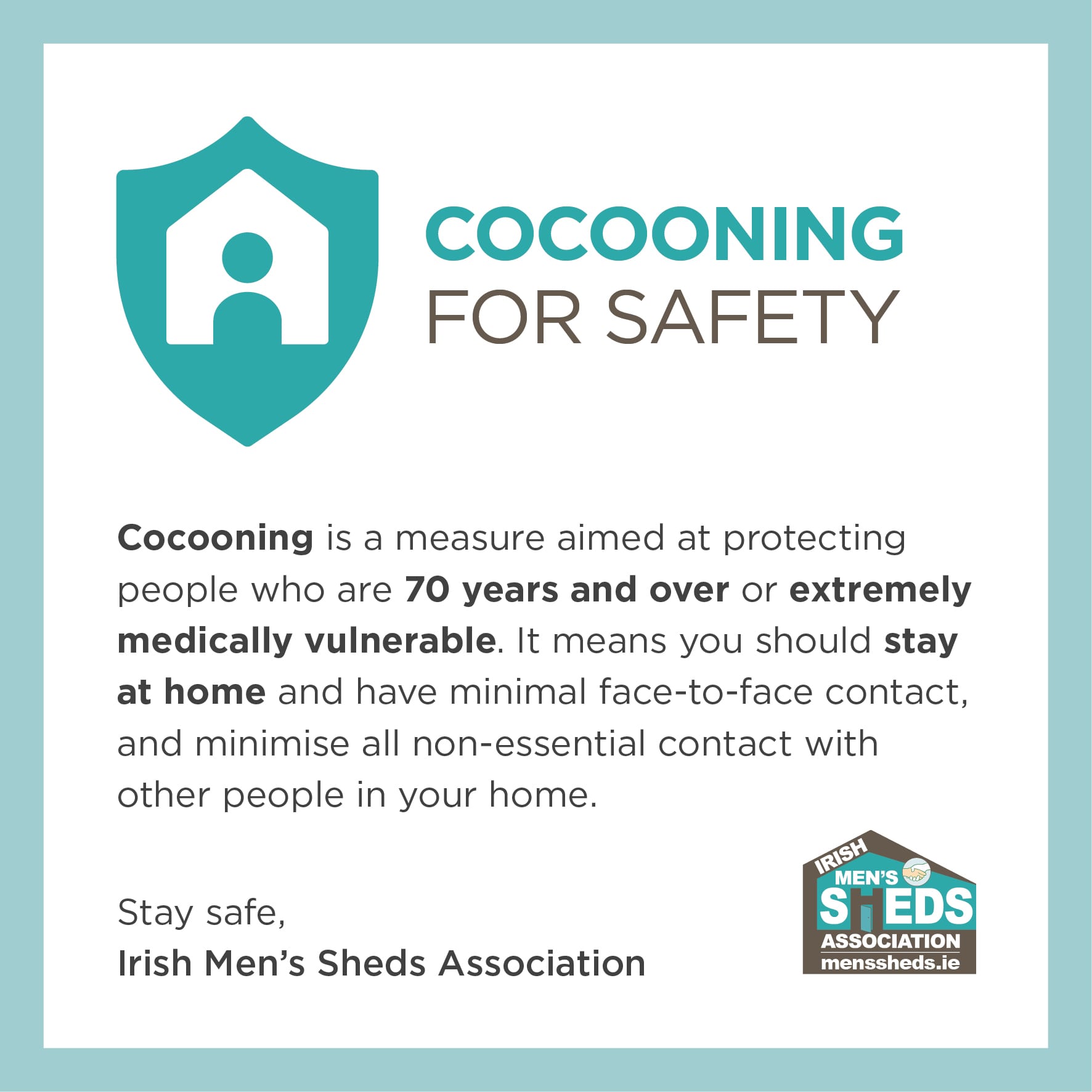COVID-19 Information
It is important that we all get our advice and information from reputable sources, particularly the HSE and Department of Health. IMSA has collated the following information from the HSE for ease of reading.
You and your shed
While the coronavirus outbreak means that sheds are temporarily closed, that does not mean you should stop talking to shedders.
Here are some practical ways that you can continue to connect with one another while respecting physical distancing:
- Set up a WhatsApp or group text – If you need help with this, contact our office on 01 891 6150 or email info@menssheds.ie
- Check in through phone or email with IMSA – We are here to provide advice and support. We will continue to operate as normal in answering your queries by phone and email.
- Operate a ‘buddy system’ – We suggest ensuring that everyone in your shed ‘buddies up’ with another member and stay in contact. This will help to ensure that members, particularly those that are living alone, are not isolated during this difficult time.
What are the symptoms?
The most common symptoms of coronavirus include:
- A cough, this can be any kind of cough
- Shortness of breath
- Breathing difficulties
- Fever/high temperature
If you have any of these symptoms, you should behave as if you have the virus and self-isolate for 14 days. People in your household will also need to restrict their movements.
What is cocooning?
How to cocoon

Do
Stay at home at all times and avoid any face-to-face contact for 2 weeks from 27 March.
If you have a garden or balcony, spend time outside for fresh air.
Keep in touch with family and friends over the phone or online if you have access.
Keep yourself mobile by getting up and moving as much as possible.
Ask neighbours, family or friends to get any shopping or medicine you need – do not go out shopping.
Arrange for food or medicine deliveries to be left outside your door.
Use the phone if you need to contact your GP or other services – do not leave your house.
Don’t
Do not go outside your home and garden.
Do not have visitors to your home, except for essential carers.
Do not attend any gatherings, including gatherings with family and friends anywhere.
How can I protect myself and others from getting coronavirus?
There are a number of things we can do to protect ourselves and others, particularly by practising good hygiene.
Stay at home
You are advised to stay at home to help slow the
spread of the coronavirus. There are only a few exceptions
to leaving your home:
- Shop for essential food and household goods
- Attend medical appointments, collect medicine or other health products
- Care for children, older people or other vulnerable people – social family visits are prohibited.
- Exercise briefly by yourself, or with children from your family and only within 2km of your home. You can travel beyond 2km if shopping for essential food and household goods.
- Travel to work, if you provide an essential service.
There is also further advice on
- restricting your movements if you live with someone who has symptoms of coronavirus, has coronavirus is has returned home from another country.
- Self-isolating if you have symptoms
Social (physical) Distancing
Social distancing is important to help slow the spread of coronavirus.
It does this by minimising contact between potentially infected
individuals and healthy individuals.
The HSE recommends that you
- Keep a space of 2 metres (6.5ft) between you and otherZ.
- Avoid communal sleeping areas.
- Avoid any crowded places.
- Not shake hands or have close physical contact with other people, if possible.
Hand hygiene
Practice the following advice as strictly as possible
and encourage others to follow this advice too.
DO
- Wash your hands properly
- Cover your mouth and nose with a tissue or your sleeve when you cough and sneeze
- Put used tissues into a bin and wash your hands
- Avoid close contact with people who are unwell
- Follow travel advice issued from the Department of Foreign Affairs
- Stay at home if you are stick to help stop the spread of whatever infection you may have
DON’T
- Do not touch your eyes, nose or mouth if your hands are not clean
- Do not share objects that touch your mouth – for example, bottles or cups.
Wash your hands properly and often
You should always wash your hands:
- after coughing or sneezing
- before and after eating
- before and after preparing food
- if you were in contact with someone who has a fever or respiratory symptoms (cough, shortness of breath, difficulty breathing)
- before and after being on public transport if you must use it
- before and after being in a crowd (especially an indoor crowd)
- when you arrive and leave buildings including your home or anyone else’s home
- if you have handled animals or animal waste
- before having a cigarette or vaping
- if your hands are dirty
- after toilet use
